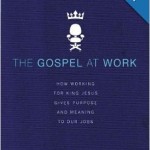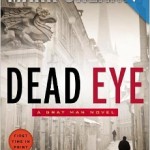I love to read. By God’s grace I am a pretty fast reader; I usually read a couple books each week. I find it helpful to summarize my thoughts on each book and I offer those thoughts in the hope that you will be encouraged to either read or pass over the given title.
 Looking Unto Jesus by Isaac Ambrose. My introduction to Ambrose’s classic work first came through Meet the Puritans, where Beeke and Pederson called it, “A classic of Christ-centered divinity.” Then Mark Jones suggested that I consider Ambrose’s Christology for my master’s thesis and I knew I should buy the book. After a few years of collecting dust in my study, I finally grabbed to book, dusted off the pages, and sat down to feast. And what a feast it was! Taking Hebrews 12:2 as his starting point, Ambrose lifts Christ up and simply stares at His glory. He says “looking [unto Jesus] is comprehensive of knowing, desiring, hoping, believing, loving, and enjoying” Him. The work meditates deeply on the person and work of Christ considering everything from His eternity, to His generation, to His birth, death, and second coming. Chapter 2 in Book 4 is typical of Ambrose’s approach: he defines what it means to see Jesus”carrying on the great work of our salvation in His intercession” and then goes on to show how to consider, desire, hope, believe, have joy, pray to, and conform to Jesus in this respect. Only Owen The Glory of Christ or Goodwin’s The Heart of Christ can top this Christological summit.
Looking Unto Jesus by Isaac Ambrose. My introduction to Ambrose’s classic work first came through Meet the Puritans, where Beeke and Pederson called it, “A classic of Christ-centered divinity.” Then Mark Jones suggested that I consider Ambrose’s Christology for my master’s thesis and I knew I should buy the book. After a few years of collecting dust in my study, I finally grabbed to book, dusted off the pages, and sat down to feast. And what a feast it was! Taking Hebrews 12:2 as his starting point, Ambrose lifts Christ up and simply stares at His glory. He says “looking [unto Jesus] is comprehensive of knowing, desiring, hoping, believing, loving, and enjoying” Him. The work meditates deeply on the person and work of Christ considering everything from His eternity, to His generation, to His birth, death, and second coming. Chapter 2 in Book 4 is typical of Ambrose’s approach: he defines what it means to see Jesus”carrying on the great work of our salvation in His intercession” and then goes on to show how to consider, desire, hope, believe, have joy, pray to, and conform to Jesus in this respect. Only Owen The Glory of Christ or Goodwin’s The Heart of Christ can top this Christological summit.
 The Gospel at Work: How Working for King Jesus Gives Purpose and Meaning to Our Jobs by Sebastian Traeger and Greg Gilbert. It’s been quite a while since I read a book and immediately thought, “I need to get this into as many hands as possible.” The Gospel at Work is one such book. I wholeheartedly concur with Dever when he says, “I want to make this a basic staple in my discipling.” The book is largely built around two primary pitfalls one can have in approaching work:
The Gospel at Work: How Working for King Jesus Gives Purpose and Meaning to Our Jobs by Sebastian Traeger and Greg Gilbert. It’s been quite a while since I read a book and immediately thought, “I need to get this into as many hands as possible.” The Gospel at Work is one such book. I wholeheartedly concur with Dever when he says, “I want to make this a basic staple in my discipling.” The book is largely built around two primary pitfalls one can have in approaching work:
On the one hand, we can let our job become an idol. Our work can become the primary object of our passions, our energy, and our love. We end up worshiping our job. On the other hand, we can slip into being idle in our work. When we fail to see God’s purposes in our work, we don’t really care must about it. We fail to give any attention to it, or we despise it and generally neglect our responsibility to serve as if we are serving the Lord. (18)
Traeger and Gilbert swiftly show how faith in Christ answers both of these pitfalls, and I am grateful they did it without succumbing to standard “gospel-centered” cliches. They are spot on when they say, “Ultimately the evidence of the gospel in our lives at work is not so much in the things we do but in the freedom we enjoy in the midst of our work” (57). Filled with an uncanny amount of clarity and practicality, I wouldn’t be surprised if this proves to be one of my favorite books in 2014. I’ve already bought several copies to add to our church’s bookshelf.
 Dead Eye by Mark Greaney. Dead Eye is the fourth, and latest, installment in Greaney’s “Gray Man Series.” I wondered aloud after reading book three if it was possible for Greaney to offer up more than a one-dimensional thrill ride. I think I would say, after reading this one, “Yes, but barely. Maybe he can provide a 1.5-deminsional thrill ride.” Whatever that is. Dead Eye finds Court Gentry doing battle with a “singleton” (think lone ranger) who needs to save the Gray Man in order to destroy him – let the reader understand. Greaney wrapped up one substantial plot thread while leaving another one dangling oh so close. Less bloated with unbelievable action scenes and possessing more textured character development than other books in the series, Dead Eye gives hope for what’s to come. I believe the next book in the series is slated for release in late 2015.
Dead Eye by Mark Greaney. Dead Eye is the fourth, and latest, installment in Greaney’s “Gray Man Series.” I wondered aloud after reading book three if it was possible for Greaney to offer up more than a one-dimensional thrill ride. I think I would say, after reading this one, “Yes, but barely. Maybe he can provide a 1.5-deminsional thrill ride.” Whatever that is. Dead Eye finds Court Gentry doing battle with a “singleton” (think lone ranger) who needs to save the Gray Man in order to destroy him – let the reader understand. Greaney wrapped up one substantial plot thread while leaving another one dangling oh so close. Less bloated with unbelievable action scenes and possessing more textured character development than other books in the series, Dead Eye gives hope for what’s to come. I believe the next book in the series is slated for release in late 2015.
 The Three C’s by Mark Stone. My dad just published a book on career enrichment based on his journey from one career to another back in 2009. The burden of the book is to provide a primer on “how to build, enhance, and protect your career. This plan of action – characterizing, connecting, and communicating – is not the best plan. It is not the only plan. It is just a proven plan.” And, I would add, a commonsense plan. I am really not a part of the book’s target audience as a pastor, but the principles are simple enough to have broad application.
The Three C’s by Mark Stone. My dad just published a book on career enrichment based on his journey from one career to another back in 2009. The burden of the book is to provide a primer on “how to build, enhance, and protect your career. This plan of action – characterizing, connecting, and communicating – is not the best plan. It is not the only plan. It is just a proven plan.” And, I would add, a commonsense plan. I am really not a part of the book’s target audience as a pastor, but the principles are simple enough to have broad application.
